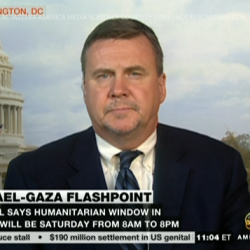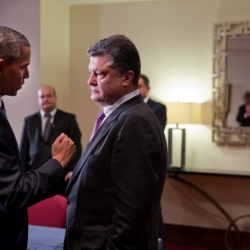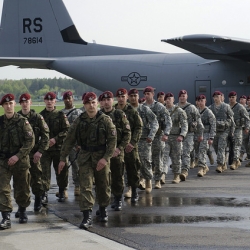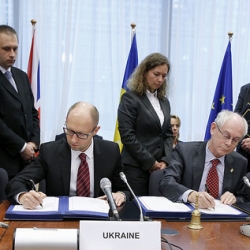Increasing Pressure on Russia to Resolve the Ukraine Conflict
Increasing Pressure on Russia to Resolve the Ukraine Conflict July 23, 2014 Following the downing of Malaysian Airlines Flight 17 (MH17) in eastern Ukraine, the West faces challenges in coordinating a significant increase in pressure on Russia to bring an end to the regional conflict. Thus far, relatively modest sanctions by the United States and Europe have been effective in imposing costs on the Russian economy and were likely a factor in the removal of Russian forces from the border and Moscow’s backing away from the threat of invading eastern Ukraine. Nonetheless, Russian support for separatists has continued to fuel the conflict. Short of an unlikely reversal of Russian policy, the United States should employ more assertive diplomatic measures. Perhaps the greatest challenge facing Washington… Read More ›
Stopping the Dangerous Political Games with State Department Nominees
US Department of State twitter photo, 7/3/14 Fueled by conservative obstructionism, over 50 nominees for top posts at the Department of State remain unconfirmed by the U.S. Senate, including over 40 nominees for ambassador positions. But the foot-dragging is not motivated by substantive concerns regarding most of the nominees. Instead, conservative obstructionism appears to be primarily a politically motivated retaliation – what Senator Corker (R-TN) called “blowback” – for last year when the Senate made filibustering nominations more difficult following conservatives’ abuse of that tactic at historically high levels. This kind of political brinksmanship is dangerous and holds American interests at risk in regions across the world where diplomacy plays a leading role in advancing American national security. As the recent confirmations of the U.S.… Read More ›
Political Upheaval in the Middle East: U.S. Middle East Policy at a Time of Regional Fragmentation and Competition:Lessons for U.S. Policy from the Past Three Years| Brian Katulis
By Brian Katulis and Peter Jul June 16th, 2014 | Center For American Progress The ongoing fragmentation in Iraq and Syria is the latest episode in a series of events that is shaking the foundations of today’s Middle East. The region has entered a fluid period of transition involving the growing power of non-state actors, including new Islamist extremist groups, at a time of increased competition for influence among the key countries in the region. For decades, the United States has grappled with formulating a Middle East strategy that advances both its interests and its values. Under President Barack Obama, the top U.S. priorities in the Middle East have included preventing a terrorist attack on the homeland; stopping Iran from obtaining a nuclear weapon; ending… Read More ›
5 Key Takeaways from Obama’s West Point Speech
Obama arrives at West Point to deliver his commencement speech to the class of 2014. [U.S. Military Academy via Twitter, 5/28/14]President Obama laid out his foreign-policy vision for his second term in a commencement address this morning at the U.S. Military Academy at West Point. While the United States will act decisively and unilaterally against imminent threats to its national security, he said, it must also act cautiously as it assesses how to respond to security challenges around the world. “When issues of global concern that do not pose a direct threat to the United States are at stake – when crises arise that stir our conscience or push the world in a more dangerous direction – then the threshold for military action must be… Read More ›
NSN Quoted in Washington Examiner on Tweeting Obama’s Foreign Policy
Can you summarize Obama’s foreign policy in a tweet? By Susan Crabtree May 28th, 2014 | Washington Examiner Six years into the presidency, the Obama doctrine remains hard to put into words. As President Obama once again seeks to spell out his approach to the world, both critics and supporters say it’s difficult to characterize his views with the kind of pithy statements that worked for previous presidents. Unlike George W. Bush‘s “freedom agenda” or Ronald Reagan‘s focus on the Cold War with the Soviet Union, Obama’s time in office has come without a unifying theme. At a speech Wednesday at West Point, Obama will articulate a “new stage” in America’s relations with the world after the Iraq and Afghanistan wars that includes a foreign… Read More ›
Working Through the Tough Issues with Iran
EU High Representative for Foreign Affairs and Security Policy Catherine Ashton sits with Iranian Foreign Minister Mohammad Javad Zarif during P5+1 Iran Talks meeting in Vienna on March 18, 2014 [European External Action Service, 3/18/14]This week, the P5+1 began a new round of talks over Iran’s nuclear program. The talks are scheduled to continue through Saturday. Thus far, news out of the negotiations indicates that talks have been challenging, characterized as “good but difficult” by Iranian Deputy Foreign Minister Abbas Araghchi, while U.S. officials have called for more progress. The primary sticking point in this round of negotiations has been Iran’s centrifuges used for nuclear enrichment. Iran’s negotiating position has been to expand, rather than decrease, its enrichment capacity and centrifuge count – a position… Read More ›
Ukraine: Seeing Beyond the Current Crisis
Ukraine: Seeing Beyond the Current Crisis April 25, 2014 The deteriorating situation in eastern Ukraine and the possibility of Russian escalation highlights the need for a longer-term strategy for dealing with Moscow and assisting Kiev. Media reports indicate this is already underway in Washington. In developing longer-term strategy, however, it will be vital to get a number of key issues right – especially as some conservatives continue to offer unconstructive proposals. Most immediately, it will be vital to calibrate the degree of risk worth taking in dealing with Moscow over Ukraine that properly places the present regional crisis in its broader context. Right-sizing the extent of military responses by the U.S. and NATO will remain important to reassure allies without over-using military tools that ultimately… Read More ›
Continuing Strategic Rebalancing to Asia: The Do’s and Don’ts
President Obama at the welcome ceremony at the Imperial Palace during his state visit to Tokyo, Japan on April 24, 2014 [State Department photo by William Ng, 4/24/14]With Vice President Biden in Kiev and President Obama arriving in Asia tomorrow, the need and capacity for the United States to manage multiple priority issues is on full display, including balancing long-term strategy with near-term crises. In Asia, the President will meet with leaders in Japan, the Philippines, South Korea and Malaysia to consolidate and deepen strategic rebalancing to the Asia-Pacific. As a long-term policy movement, rebalancing to Asia will require sustained attention at the whole-of-government level – particularly to ensure properly-scaled distribution of resources – and coordinated priorities. Of special concern going forward is investing the… Read More ›
Economic Statecraft and Near-Term Options to Impose Costs on Russia
Economic Statecraft and Near-Term Options to Impose Costs on Russia April 16, 2014 The United States and Europe are likely to wait until after their talks in Geneva tomorrow with Russia and Ukraine before imposing additional sanctions on Moscow for its apparent covert involvement in the pro-Russian uprisings in eastern Ukraine. Nonetheless, a strong set of economic tools are available to impose costs on Russia as the West further adapts economic statecraft for disciplinary purposes towards Moscow. Because any such measures require joint U.S.-EU action to be successful – as with any other courses of action – the diplomatic challenges to sizably escalating economic costs on Russia are very real. Yet, recent comments by the British Foreign Minister indicate that Europe may be on track… Read More ›





